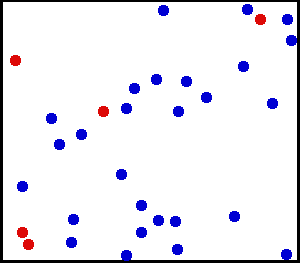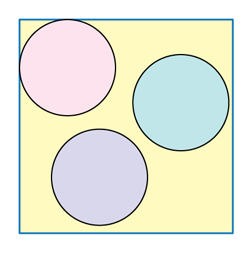I am interested to learn to what extent results on billiards
in polygons have been extended to multiple balls.
Assume the balls have equal radii and the same mass,
the same initial speed, and all
collisions are perfectly elastic, as depicted in this* image:

To be specific, let me start with just the square table.
For single particle billiards, it is well known
that (1) a trajectory of rational slope that avoids the corners
is periodic, and (2) a trajectory of irrational slope that avoids
the corners will be "uniformly distributed" in the sense
that it spends equal times in equal areas.
Are there analogous results for billiard systems of $n>1$ balls within a square?
Perhaps it is necessary to make some assumption concerning
the size of the ball radii and the box dimensions?
3 balls http://cs.smith.edu/%7Eorourke/MathOverflow/ThreeBalls.jpg
The literature I've seen on billiard dynamics does not
explore this territory. Likely there are results in the literature,
in which case pointers would be appreciated. Thanks!
*This impressive [Wikipedia image][3] by A.Greg was once the "Picture of the Day."
Addendum. Following Steve Huntsman's keyword hint, I retrieved _Hard Ball Systems and the Lorentz Gas_, which indeed contains many fascinating results. I will mention two:
- In a chapter by Murphy & Cohen, an easy but pleasing result: For $n$ hard spheres moving in unbounded Euclidean space, with any combination of masses, there exist initial conditions such that $\binom{n}{2}$ collisions occur.
- In a chapter by Burago, Ferleger, & Krononenko, a difficult-to-establish bound: The maximal number of collisions that may occur for $n$ balls moving in a simply connected Riemannian space of nonpositive sectional curvature never exceeds $$(400 n^2 \max{/}\min)^{2 n^4} \;,$$ where $\max{/}\min$ is the largest ratio of masses. Note there is no dependence on the radii. Matters are (or were in 2000) unclear without the nonpositive curvature assumption.
